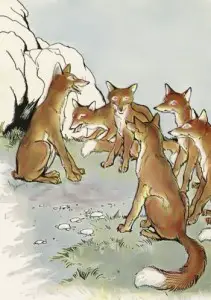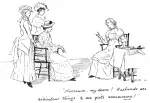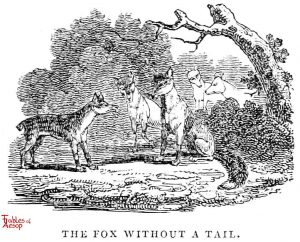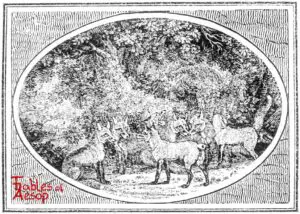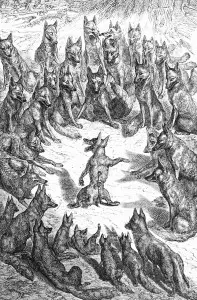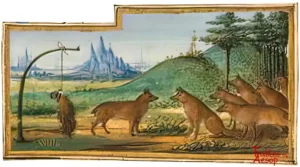A Fox lost his tail in a trap and tried to get fellow foxes to trim their tails. They saw through the ruse.
Distrust advice from someone who stands to gain.

Aesop For Children (The Fox Without a Tail)
A Fox that had been caught in a trap, succeeded at last, after much painful tugging, in getting away. But he had to leave his beautiful bushy tail behind him.
For a long time he kept away from the other Foxes, for he knew well enough that they would all make fun of him and crack jokes and laugh behind his back. But it was hard for him to live alone, and at last he thought of a plan that would perhaps help him out of his trouble.
He called a meeting of all the Foxes, saying that he had something of great importance to tell the tribe.
When they were all gathered together, the Fox Without a Tail got up and made a long speech about those Foxes who had come to harm because of their tails.
This one had been caught by hounds when his tail had become entangled in the hedge. That one had not been able to run fast enough because of the weight of his brush. Besides, it was well known, he said, that men hunt Foxes simply for their tails, which they cut off as prizes of the hunt. With such proof of the danger and uselessness of having a tail, said Master Fox, he would advise every Fox to cut it off, if he valued life and safety.
When he had finished talking, an old Fox arose, and said, smiling:
“Master Fox, kindly turn around for a moment, and you shall have your answer.”
When the poor Fox Without a Tail turned around, there arose such a storm of jeers and hooting, that he saw how useless it was to try any longer to persuade the Foxes to part with their tails.
Moral
Do not listen to the advice of him who seeks to lower you to his own level.

Caldecott
A Fox had had his tail docked off in a trap, and in his disgrace began to think his life not worth living. It therefore occurred to him that the best thing he could do was to bring the other Foxes into the same condition, and so conceal his own deficiency in the general distress. Having assembled them all together he recommended them to cut off their tails, declaring that a tail was an ungraceful thing; and, further, was a heavy appendage, and quite superfluous. To this one of them rejoined: “My good friend, if this had not been to your own advantage you would never have advised us to do it.”

Eliot/Jacobs Version
A Fox caught its tail in a trap, and lost all of it but a stump. He determined to put a bold face upon his misfortune, and gathered all the foxes to a general meeting. When they had assembled the Fox proposed that they should all do away with their tails. He pointed out how inconvenient a tail was when they were pursued by the dogs and how much it was in the way when they desired to sit down. “That is all very well,” said one of the older foxes; “but I do not think you would have recommended we dispense with our chief ornament if you had not happened to lose it yourself.”

Samuel Croxall
A Fox being caught in a steel trap, by his tail, was glad to compound for his escape with the loss of it; but upon coming abroad into the world, began to be so sensible of the disgrace such a defect would bring upon him, that he almost wished he had died, rather than left it behind him. However, to make the best of a bad matter, he formed a project in his head, to call an assembly of the rest of the Foxes, and propose it for their imitation, as a fashion which would be very agreeable and becoming. He did so; and made a long harangue upon the unprofitableness of tails in general, and endeavoured chiefly to show the awkwardness and inconvenience of a Fox’s tail in particular; adding, that it would be both more graceful, and more expeditious, to be altogether without them; and that for his part, what he had only imagined and conjectured before, he now found by experience; for that he never enjoyed himself so well, nor found himself so easy as he had done since he cut off his tail. He said no more, but looked about with a brisk air, to see what proselytes he had gained; when a sly old thief in the company, who understood trap, answered him with a leer, 1 believe you may have found a conveniency in parting with your tail, and when we are in the same circumstances, perhaps we may do so too.
THE APPLICATION
If men were but generally as prudent as foxes, they would not suffer so many silly fashions to obtain, as are daily brought in vogue, for which scarce any reason can be assigned besides the humour of some conceited vain creature; unless, which is full as bad, they are intended to palliate some defect in the person that introduces them. The petticoat of a whole sex has been sometimes swelled to sach a prodigious extent, to screen an enormity, of which only one of them has been guilty. And it is no wonder that Alexander the Great could bring a wry neck into fashion in a nation of slaves, when we consider what power of this nature some little insignificant dapper fellows have had among a free people.

Thomas Bewick (The Fox Without a Tail)
A Fox being caught in a trap, escaped after much difficulty with the loss of his tail. He was, however, a good deal ashamed of appearing in public without this ornament, and at last, to avoid being singular and ridiculous in the eyes of his own species, he formed the project of calling together an assembly of Foxes, and of persuading them that the docking of their tails was a fashion that would be very agreeable and becoming. Accordingly he made a long harangue to them for that purpose, and endeavoured chiefly to shew the awkwardness and inconvenience of a Fox’s tail, adding that they were quite useless, and that they would be a very great deal better without them. He asserted, that what he had only conjectured and imagined before, he now found by experience to be true, for he never enjoyed himself so much, and found himself so easy as he had done since he cut off his tail. He then looked round with a brisk air, to see what proselytes he had gained; when a sly old Fox in company answered him, with a leer: I believe you may have found a convenience in parting with your tail, and perhaps when we are in the same circumstances, we may do so too.
APPLICATION.
Many of the fashions which obtain in the world, originate in the whim or caprice of some vain conceited creature, who takes a pride in leading the giddy multitude in a career of folly. Others again take their rise from an artful design to cover some vice, or hide some deformity in the person of the inventor. Projectors and planners of a higher stamp are also not uncommon in the world. These men appear to toil only for the public good, and the sacred name of patriotism is their shield. It, however, often happens that when their deep schemes are opened out, they are found to proceed from nothing better than self-interested motives, and a sincere desire to serve themselves.
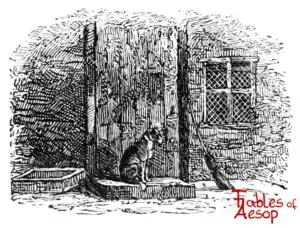

JBR Collection
A Fox was once caught in a trap by his tail, and in order to get away, was forced to leave it behind. Knowing that without a tail he would be a laughing-stock for all his fellows, he resolved to try to induce them to part with theirs. So at the next assembly of Foxes he made a speech on the unprofitableness of tails in general, and the inconvenience of a Fox’s tail in particular, adding that he had never felt so easy as since he had given up his own. When he had sat clown, a sly old fellow rose, and waving his long brush with a graceful air, said, with a sneer, that if, like the last speaker, he had lost his tail, nothing further would have been needed to convince him; but till such an accident should happen, he should certainly vote in favour of tails.

Townsend version
A Fox caught in a trap escaped, but in so doing lost his tail. Thereafter, feeling his life a burden from the shame and ridicule to which he was exposed, he schemed to convince all the other Foxes that being tailless was much more attractive, thus making up for his own deprivation. He assembled a good many Foxes and publicly advised them to cut off their tails, saying that they would not only look much better without them, but that they would get rid of the weight of the brush, which was a very great inconvenience. One of them interrupting him said, “If you had not yourself lost your tail, my friend, you would not thus counsel us.”

L’Estrange version
There was a Fox taken in a trap, that was glad to compound for his neck by leaving his tayle behind him. It was so uncouth a sight, for a fox to appear without a tayle, that the very thought on’t made him e’en weary of his life; for ’twas a loss never to be repair’d: but however for the better countenance of the scandal, he got the Master and Wardens of the Foxes Company to call a Court of Assistants, where he himself appear’d, and made a learned discourse upon the trouble, the uselessness, and the indecency of foxes wearing tayles. He had no sooner say’d out his say, but up rises a cunning snap, then at the bord, who desir’d to be enform’d, whether the worthy member that mov’d against the wearing of tayles, gave his advice for the advantage of those that had tayles, or to palliate the deformity and disgrace of those that had none.
Moral
When a man has any notable defect, or infirmity about him, whether by nature, or by chance, ’tis the best of his play, to try the humour, if he can turn it into a fashion.

Crane Poetry Visual
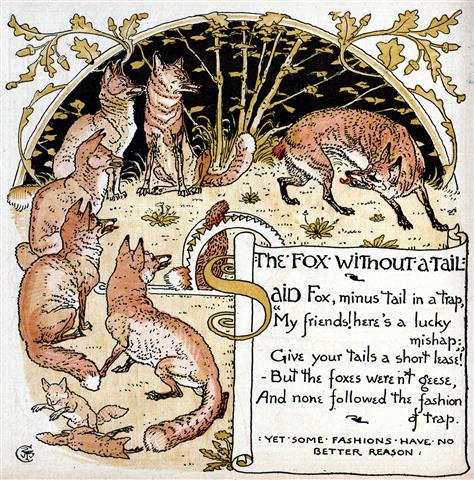
Said Fox, minus tail in a trap,
“My friends! Here’s a lucky mishap;
Give your tails a short lease!”
But the foxes weren’t geese,
And none followed the fashion of trap.
Yet some fashions have no better reason.

Gherardo Image from 1480

Vulpes Sine Cauda
In foveam incidit vulpecula et inde, cauda detruncata, occurrit multis vulpeculis. Quas cum indignabunde conspexerat, inquit, “Fraterculi, quo vaditis?” “Ad leonis basilicam eundum est nobis,” respondebant. “Ad leonis basilicam?” inquit vulpes. “Profecto, ego ab ea nuperrime redii, et mos iamiam novellus est ut omnes ferae detruncent caudas.” Quibus auditis, illico detruncabant illae suas caudas. Quas cum vidit vulpes, irrisit et consolabatur se socios, si non periculi, saltem pudoris, creavisse.
Moral
Solamen miseris est socios habuisse doloris.
Perry #017
